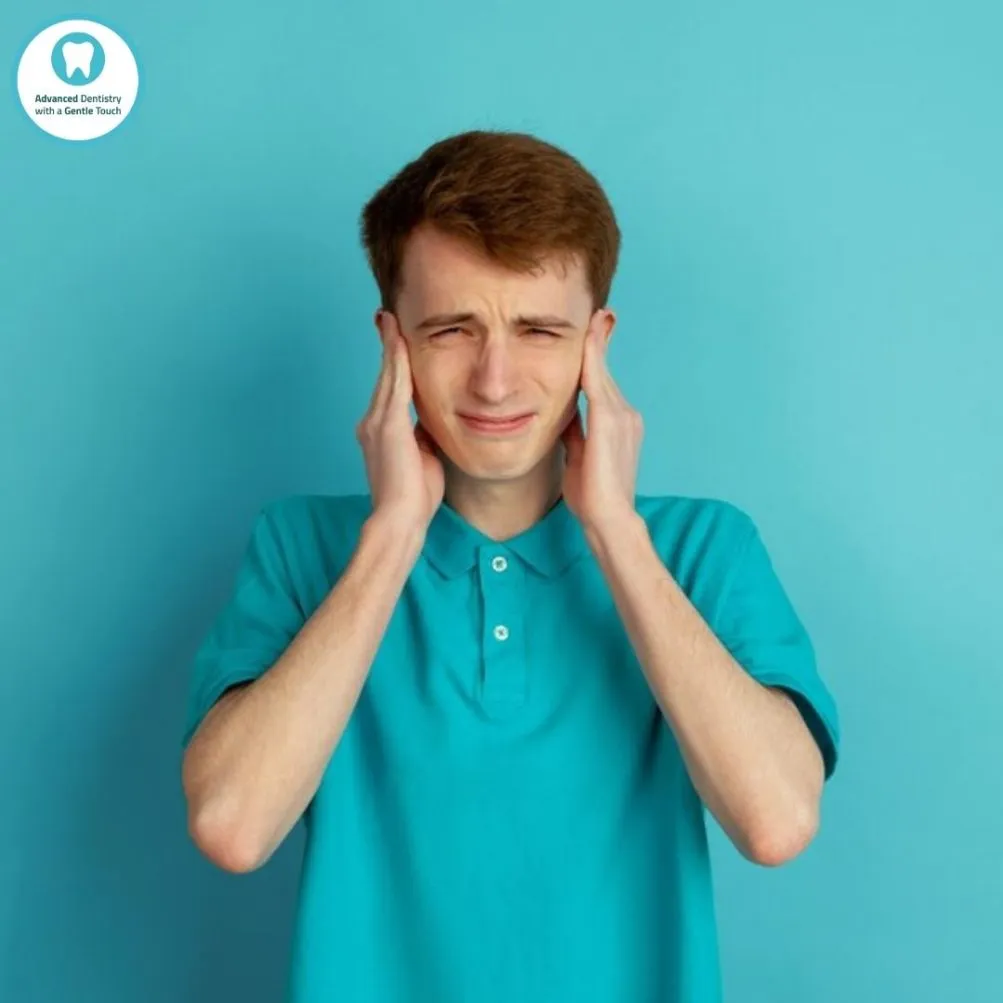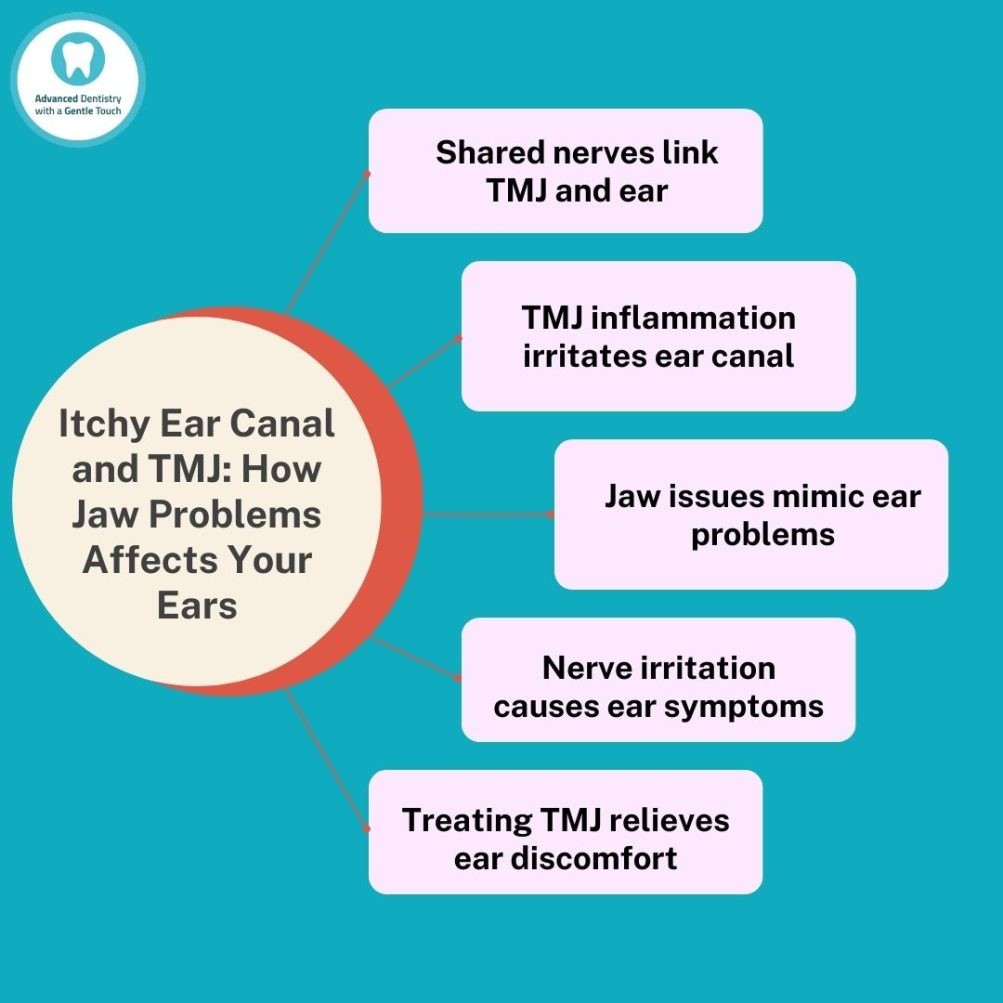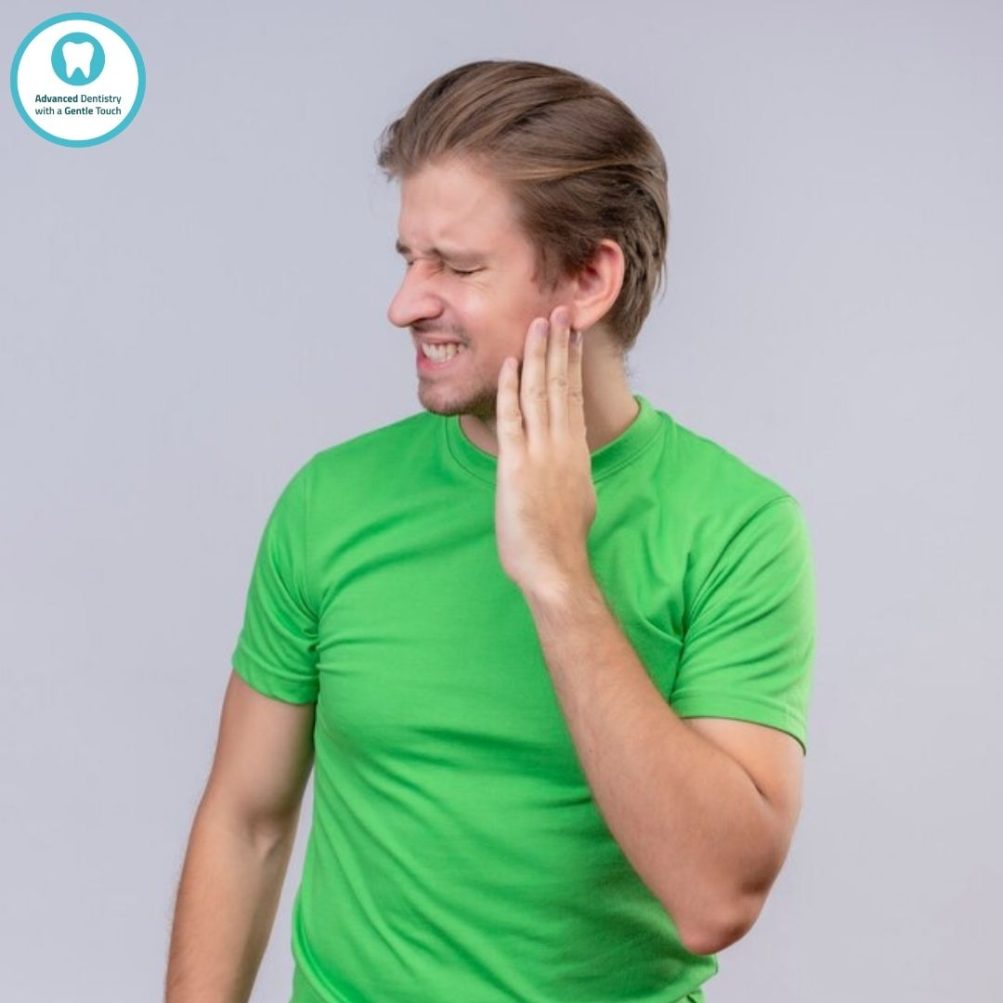Itchy Ear Canal and TMJ: How Jaw Problems Affect Your Ears

The temporomandibular joint (TMJ) connects your jawbone to your skull's temporal bone, allowing you to talk, chew, and yawn. This joint enables smooth jaw movement, coordinated by the jaw muscles. When TMJ disorders occur, they disrupt these functions and can lead to various symptoms, making seeking TMJ treatment necessary.
A lesser-known link exists between TMJ disorders and ear-related issues, such as itchy ears or an itchy ear canal. Many people wonder, "Why do my ears itch?" or "Why is the inside of my ear itchy?" The answer to these is in the location of the TMJ. The TMJ is located close to the inner ear, so inflammation or dysfunction in the joint can cause ear itching inside. This connection explains why some experience ear itching alongside jaw pain.
These symptoms are more common than you might think, affecting the quality of life for many individuals. Understanding the link between TMJ disorders and itchy ears is crucial for effective management. By recognizing this connection, you can seek appropriate treatment options to reduce inflammation and alleviate discomfort.

The Connection Between TMJ and Ear Problems
Shared Anatomy and Nerve Pathways
The temporomandibular joint (TMJ) is located close to the ear, near the ear canal and temporal bone. Because of this, the TMJ and the ear share some important nerves, like the auriculotemporal nerve. This nerve connects the TMJ to parts of the ear, making the two areas closely linked.
When the TMJ doesn’t work properly, it can irritate these shared nerves. This irritation can cause the brain to misinterpret signals, leading to sensations like itching in the ear canal or even ear pain. This is why many people with TMJ disorders feel discomfort in their ears, even when the problem is actually in the jaw joint.
Common Ear Symptoms Linked to TMJ Disorders
TMJ disorders can cause several ear-related symptoms, even when there is no infection or other clear cause. These symptoms often include:
- Itchy ears or an ongoing feeling of itching inside the ear canal.
- Ear pain that may get worse when you move your jaw.
- A sensation of fullness in the ear, like it is blocked or clogged.
- Ringing or buzzing in the ears, also called tinnitus.
- Temporary problems with hearing, like muffled sounds or sensitivity to noise.
See also Velscope: Ways Your Dentist Can Save Your Life
These symptoms can be confusing because they seem like they are caused by ear issues. However, they are often linked to TMJ problems. Recognizing this connection helps ensure proper treatment and avoids unnecessary worry or incorrect diagnoses.

Why TMJ Disorders Cause Itchy Ear Canals
Inflammation and Nerve Irritation
TMJ disorders often involve inflammation in the joint, which can irritate nearby nerves, including the auriculotemporal nerve. This nerve connects the TMJ to parts of the ear canal, playing a role in ear sensations. When the joint becomes inflamed, the nerve can send incorrect signals to the brain, leading to sensations like itching inside the ear canal.
This irritation can make your ears feel itchy, even when there’s no infection or external cause. Along with itching, people might also experience discomfort such as ear pain, fullness, or a tickling sensation deep inside the ear. These symptoms often worsen when the TMJ is strained, such as during chewing or jaw movement.
Secondary Causes of Itchiness from TMJ Issues
Secondary factors from TMJ disorders can also contribute to itchy ears. For example, stress-related bruxism (teeth grinding) puts extra pressure on the TMJ, worsening inflammation and nerve irritation. This added strain can make the itching sensation more noticeable.
Jaw misalignment or tight jaw muscles from TMJ disorders can also reduce blood flow and alter nerve responses. This can make the ear canal feel dry, itchy, or even ticklish. Addressing these underlying issues, such as managing stress or improving jaw alignment, can help reduce ear-related discomfort and improve overall well-being.
Diagnosing the Underlying Problem
Signs That Point to TMJ-Related Ear Issues
TMJ-related ear symptoms often last longer and don’t go away with usual treatments for ear problems like infections or wax removal. If your ears feel itchy, full, or painful but there’s no sign of an ear infection, the cause might be TMJ dysfunction. These symptoms often appear with other jaw-related problems that can help identify the connection.
Common signs of TMJ disorders include jaw pain, clicking or popping sounds when you move your jaw, and difficulty chewing. Some people also feel tightness in their jaw muscles or notice that their symptoms get worse when they open or close their mouth. These clues can help you and your healthcare provider spot TMJ-related ear issues.
See also How to Clean All-on-4 Dental Implants?

How TMJ Disorders Are Diagnosed
To diagnose TMJ disorders, a doctor or dentist will start with a physical exam. They will check how your jaw moves, look for pain or tenderness, and listen for clicking or popping sounds. They might also ask about other symptoms, like itchy ears or headaches, to understand if TMJ issues are involved.
Sometimes, imaging tests like panoramic X-rays, MRIs, or CT scans are needed. These tests give a clear picture of the joint and can show problems like inflammation, damage, or misalignment. It’s important to figure out if the issue is with the TMJ or the ear to make sure you get the right treatment. A proper diagnosis will focus on solving the real problem and improving your symptoms.
Treating Itchy Ear Canals Caused by TMJ
Managing TMJ to Relieve Ear Symptoms
Relieving TMJ disorders is the best way to reduce ear symptoms like itching. Non-surgical treatments can help ease pressure on the jaw and reduce inflammation.
- Bite guards are dental devices that stop teeth grinding, which often worsens TMJ problems. By reducing pressure on the jaw joint, they help the TMJ heal.
- Physical therapy can relax and strengthen jaw muscles, making jaw movement smoother and reducing strain on the TMJ. A professional can guide you through simple exercises that make a big difference.
- Medications, like anti-inflammatory drugs or muscle relaxants, can lower pain and swelling in the jaw joint, helping ease related ear discomfort.
These treatments focus on fixing the cause of the problem, offering long-term relief for symptoms like itchy ears.
Direct Remedies for Itchy Ears
While treating TMJ is essential, there are also simple ways to calm itchy ears. Avoid scratching the inside of your ear, as this can make the irritation worse. Over-the-counter ear drops can help by soothing dry or itchy areas in the ear canal.
These remedies are temporary fixes. To stop the itching from coming back, the TMJ disorder must be treated. Combining TMJ management with ear care ensures long-term relief. If symptoms don’t improve, talk to a doctor or dentist for help. Addressing both the ears and TMJ will reduce discomfort and improve overall well-being.

Preventing TMJ-Related Ear Issues
Lifestyle Changes for TMJ Health
Making simple lifestyle changes can help prevent TMJ-related ear problems. Stress often leads to teeth grinding (bruxism), which worsens TMJ tension. Practicing stress management techniques, such as mindfulness, deep breathing, or relaxation exercises, can ease this tension and protect your jaw.
See also Dentist Reviews Middletown & Red Bank, New Jersey
Good posture also plays a key role in TMJ health. Keeping your neck and shoulders aligned reduces strain on the jaw. Avoid habits like resting your chin on your hand or clenching your jaw, as these can misalign your TMJ and cause discomfort. Maintaining proper jaw alignment during daily activities helps reduce unnecessary pressure on the joint.
Early Intervention
Catching TMJ problems early can prevent them from turning into bigger issues. If you notice signs like jaw pain, clicking, or difficulty chewing, seek professional help right away. Early treatment can stop the problem from worsening and reduce the risk of related symptoms, like itchy ears or ear pain.
Regular dental check-ups are essential for monitoring TMJ health. Dentists can detect early signs of TMJ disorders and recommend steps to manage them. Addressing these issues early not only prevents complications but also improves your overall quality of life. Taking proactive steps now can save you from long-term discomfort later.
Conclusion
TMJ disorders can cause problems like itchy ear canals and other ear-related symptoms. Since the TMJ and ear share nerves and are located close to each other, issues in the jaw can lead to discomfort in the ear. Knowing this connection helps manage these symptoms more effectively.
To get lasting relief, it’s important to treat the TMJ disorder causing the symptoms. While ear drops or other remedies can help for a short time, fixing the TMJ problem will stop the symptoms from coming back. Using treatments like bite guards, physical therapy, or stress management can improve both jaw and ear health.
If you have ongoing ear itching, jaw pain, or any other related problems, don’t wait to get help. If you’re in Middletown, NJ, or nearby areas like Red Bank, visit www.korwin.com to find out what’s causing your discomfort. Getting treatment early can stop the problem from getting worse and improve your overall health. Whether you’re searching for a TMJ expert in Red Bank or a dentist in Middletown, NJ, taking action now can help you feel better and avoid future issues.
